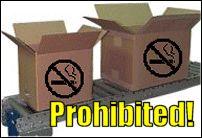
When you check shipping invoices from the carriers, how do you know they are right? Do the reports from your shipping system let you easily check your carrier invoice? And is that all you need to do? You negotiated a good contract with your package carrier(s), then you got the first bill. Surprise! The bill doesn't seem to match what you were expecting. You tallied up your shipping system's daily shipping reports, but they show the carrier's published rates, not your contract rates. No help there. Next you try to apply your contract discounts to the published rates on your shipping reports, but since the discount percentage changes according to the service you use and how much the box weighs, this is not straightforward. This is hard… Your shipping system gets your boxes out the door quickly and it sends the carriers the data they need to bill you. So far, happy customer and happy carrier. Now, how about happy shipper?
Today, shippers want their shipping system to be fast, but accurate shipping cost information is needed to check carrier bills and to be sure enough is collected to cover shipping costs. When your shipping system has accurate shipping costs, your shipping system can help with checking the bills. Even more, it can even help make sales, too. With holiday promotions, ads with "Free Shipping" and "Flat Rate Shipping" offers are prominent. These offers encourage sales, combat abandoned shopping carts and expand your market.
This is where your shipping system can really help. Ask your shipping system provider to help you get your company's contracted rates into your shipping system. If you use a multiple carrier shipping system like Harvey Software's Computerized Parcel System (CPS™), when the shipping system uses your company's rates, you benefit with accurate rate shopping and accurate cost reporting, too. That's the foundation to really put the shipping system to work for you.
Now for the best part - when your shipping system helps you make sales. Find a report in your shipping system that summarizes your company's shipping history for shipping cost by service (Ground, Next Day, etc.), a date range and by carrier. A sample of this is the Flat Rate Shipping Charge Analysis report in CPS. This report displays a break down and average cost for each carrier service. Your company's actual shipping history and charges are used, so you know you have the best information for your company. You can run the report for a range of dates, for all carriers or just the carrier(s) you choose. This is the information you need to develop a strategy of how and how much to charge for shipping, including the "Flat Rate" and "Free Shipping" offers that drive more sales. That's a clear winner.
There is a lot of power in a multiple carrier shipping system that uses your company's rates. Look for these tools in your shipping system, or visit www.HarveySoft.com if you would like to know more about CPS.



